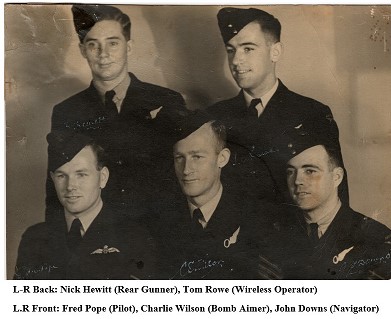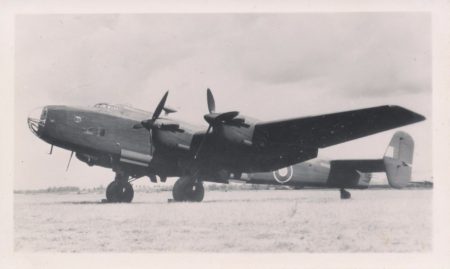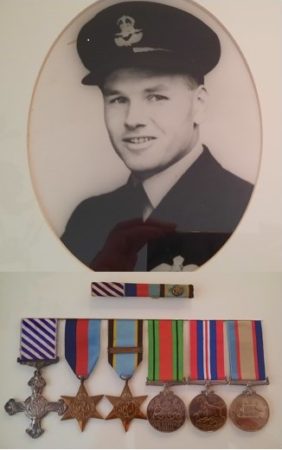Every ANZAC Day and Remembrance Day The Longwarry and District History Group research and publish the service story of one local man or woman who has served their country in war.
This year we have chosen to especially note the service of Mr. Frederick Charles Pope DFC who was a pilot, flying missions over Europe in World War 2.
Those who were around Longwarry in the 50’s and 60’s will remember the general farm produce store of Follet and Pope in Mackey Street opposite where the Post Office is now. Fred Pope was a partner in the business with Ernie Follett.
What many may not know is how a man working in the dairy factory before the war, found his way from Longwarry to flying bombers over Europe.
Fred Pope was born in Brunswick and along with his mother Elizabeth, moved to Longwarry in the late 1930s where he worked as a milk grader and tester at The Longwarry Dairymen’s Cooperative.
In December 1941 Fred Pope enlisted in the Royal Australian Air Force and after initial training he was bound for Canada in July 1942, which was where aircrew were trained for the war in Europe.
Fred Pope qualified as a pilot and was awarded the rank of Flying Officer (F/O) and then in January 1943 he left Canada to join 466 Squadron at Driffield in England.
466 Squadron was a Royal Australian Air Force (RAAF) bomber squadron made up mainly of Australian air crew along with a few officers from other Commonwealth countries such as New Zealand and Canada. It was formed in late 1942, and was attached to Bomber Command, they flew night missions over Europe and Germany. F/O Pope was one of its very first pilots.

Fred Pope and Crew
F/O Pope quickly became noticed by his superiors as this regular efficiency report shows:
(F/O Pope) “A sound and reliable officer above average in his flying skills ……”
It was not long before this reference to his flying ability was put to the test as this entry in his logbook shows
“The Air Officer commanding No. 91 Group has directed that the Logbook of 410376 F/Sgt Pope be endorsed “Highly Commended” for captaincy and pilotage of a very high order.
On the night of August 30th. 1943 when flying as captain, his aircraft developed severe engine trouble. After persisting with his operational mission until it was impossible to maintain height, he jettisoned his bombs and succeeded in making a safe and successful landing under extremely difficult conditions. By his action he saved not only the lives of his crew but safe guarded much valuable equipment.”
However as extraordinary as the skills he showed in this emergency were, it was not this incident that would later earn him The Distinguished Flying Cross for bravery and skill. That story is best explained in his citation for the award.
“Whilst on the outward flight to Leipzig one night in February 1944, the aircraft captained by Flying Office Pope, was intercepted by three enemy fighters which attacked with great persistence. In all, ten attacks were made but Flying Officer Pope manoeuvred with great skill and finally succeeded in evading the enemy aircraft. He then went on to the target which he attacked with his usual determination. This officer has participated in attacks against a wide variety of targets including Berlin.”

Handley Page Halifax Bomber
F/O Pope DFC continued with 466 Squadron until the end of the war in May 1945. He flew Wellington and Halifax heavy bombers on 40 missions for a total of 239 hours. He arrived back in Sydney in August 1945 and by this time he had received a further promotion to Flight Lieutenant.
The statistics for Bomber Command during the war were horrific, more than 57,000 pilots and crew were killed.
466 Squadron lost 81 aircraft and 184 of F/O Pope’s friends in the Squadron did not return home.
When we read the stories of these survivors, they all say that they were lucky, but it was much more than that, they needed great bravery, skill and a calmness when in extreme danger to take advantage of whatever luck came their way.
Clearly from the commendation’s F/O Pope received, he had all of these qualities and more.
It is impossible to know what went through the minds of these young men as they left Australia, but it would be fair to assume that Fred Pope did not think that he would meet his future wife, however that is exactly what happened.
Whilst on duty in England he met a bonnie Scottish woman who was in the British Air Force. Her name was Jean and they married whilst he was in England, however she was not able to travel back to Australia with her husband in 1945 and had to wait some time before she could join him in Longwarry.
Fred developed a very successful business with his partner Ernie Follett. He was a contributor to life in Longwarry as a member of community organisations. He and wife Jean lived in Witton Street and raised 4 children.
Fred Pope died prematurely in 1962 aged just 44, his wife Jean was registered by the authorities as being a War Widow indicating that Fred’s war service was a contributing factor to his early death.
It is an important note that not all war injuries are visible.
The Longwarry and District History Group are extremely grateful to Fred’s eldest daughter, Mrs. Joy Tampaline who has preserved her father’s records for more than 70 years, especially his flight logbook, and granted the History Group’s researcher unlimited access to the material and photographs.
Anyone who has undertaken any research of history will know that to access documents such as these is a very rare opportunity and a privilege.

Comments